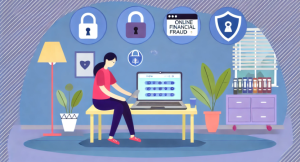In today’s digital age, the risk of financial fraud has increased dramatically. With the convenience of online transactions also comes the danger of scams and cyber threats. Understanding how to protect yourself from these risks is crucial to safeguard your assets.
The internet has become a playground for fraudsters looking to exploit unsuspecting individuals. However, by taking some preventive measures, you can reduce the chances of falling victim to financial deception. This guide will illuminate the various tactics fraudsters use and show you how to shield yourself effectively.
Recognizing the signs of financial fraud

Being vigilant is key to spotting fraudulent activities in their early stages. Unfamiliar transactions, unexpected emails about account activity, or changes in your credit report are potential red flags. Regularly reviewing your financial statements and staying informed about your credit score can alert you to suspicious behavior.
Understanding the kind of schemes fraudsters employ is essential. These can range from phishing scams, where criminals impersonate genuine institutions to obtain sensitive data, to advanced techniques like malware attacks aimed at accessing your financial information.
Moreover, consider using fraud alerts or credit monitoring services. These services can notify you of significant changes to your credit report, giving you a proactive way to handle potential threats. Remember, if it sounds too good to be true, it probably is. Trust your instincts and adopt a healthy level of skepticism when dealing with unknown entities online.
Phishing scams
Phishing scams are one of the most prevalent forms of online deception used to obtain confidential data. Typically, these scams involve emails or messages that mimic reputable sources, urging the recipient to click on malicious links or enter personal information.
Such phishing attempts can lead to identity theft, so recognizing these deceptive messages is crucial. To protect yourself, never click on links or download attachments from unknown senders.
Verify the source of the email through other means, such as directly visiting the official website of the organization purportedly contacting you. Many companies provide clear guidelines on their sites about how they will communicate with customers.
Malware attacks
Malware, short for malicious software, is a tool that fraudsters use to access your data without your consent. This type of threat can enter your system through compromised websites, downloads, or scam emails.
Once installed, malware can monitor your keystrokes, search for saved passwords, and even lock you out of your own systems. To safeguard against malware, ensure that your computer’s operating system and connected software are up to date with the latest security patches.
Using reputable antivirus and anti-malware software provides an additional layer of defense, actively scanning for threats and neutralizing them before they cause harm. Avoid downloading software or applications from untrusted sources, as these may harbor malware.
Furthermore, set your security software to update automatically so you are always protected against the latest known threats. Regular scanning of your devices can also help identify and remove harmful software that may have slipped through initial defenses.
Adopting secure online practices
Developing secure online habits plays a central role in preventing financial deceit. One effective step is using strong, unique passwords for different accounts. A mix of uppercase and lowercase letters, numbers, and special characters adds complexity to your password, thwarting hacking attempts.
Password managers can assist in storing and generating complex passwords securely. Two-factor authentication (2FA) adds an extra layer of security and is something you should enable whenever possible.
This provides an additional step beyond your password, requiring a second form of verification, such as a text message or authentication app. Being aware of your online presence and what you share on social media is equally important.
Personal details shared publicly can be used by fraudsters to impersonate you or guess passwords to gain access to your financial accounts. Restrict your privacy settings on social platforms to limit who can see your personal information.
Using secure networks
Public Wi-Fi networks are notoriously insecure and can be a hotbed for cybercriminals looking to intercept your data. Always avoid conducting any financial transactions or logging into sensitive accounts when on a public network. If you must use public Wi-Fi, consider using a Virtual Private Network (VPN) to encrypt your data, adding a layer of security in public spaces.
Be conscious of your surroundings when accessing financial information in public places. Shoulder surfing, where someone looks over your shoulder to catch glimpses of your sensitive information, is a real threat. It’s crucial to be aware of your environment and ensure that your screen is obscured from potential onlookers.
At home, ensure that your Wi-Fi network is password protected to prevent unauthorized access. Regularly update your router’s firmware and change your network’s security settings to use stronger encryption methods like WPA3. This helps prevent intrusions and keeps your internet traffic secure from prying eyes.


